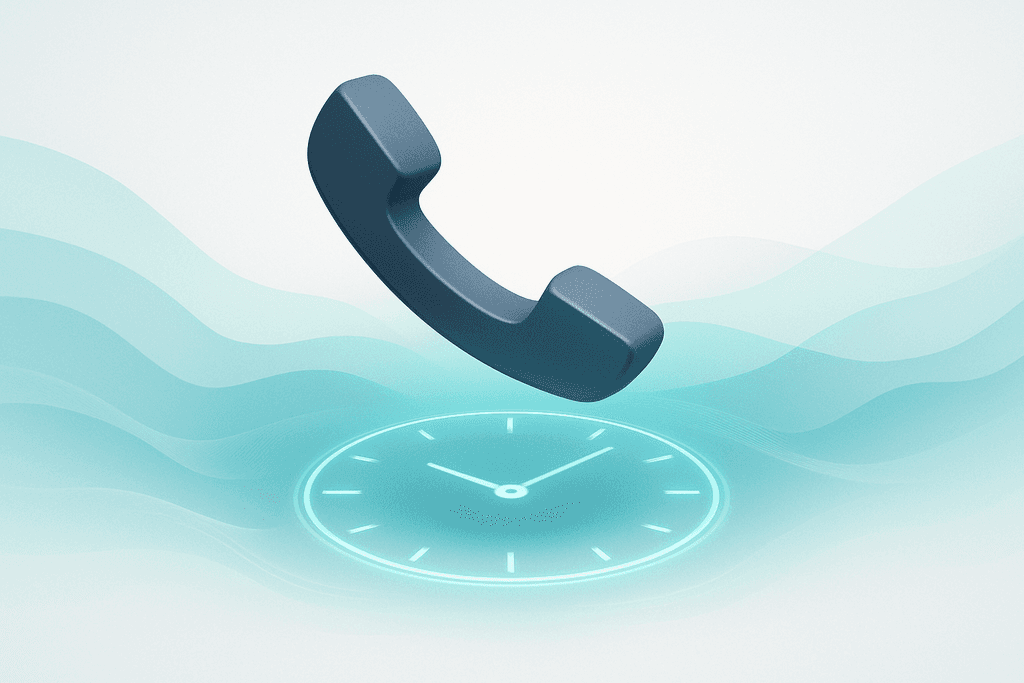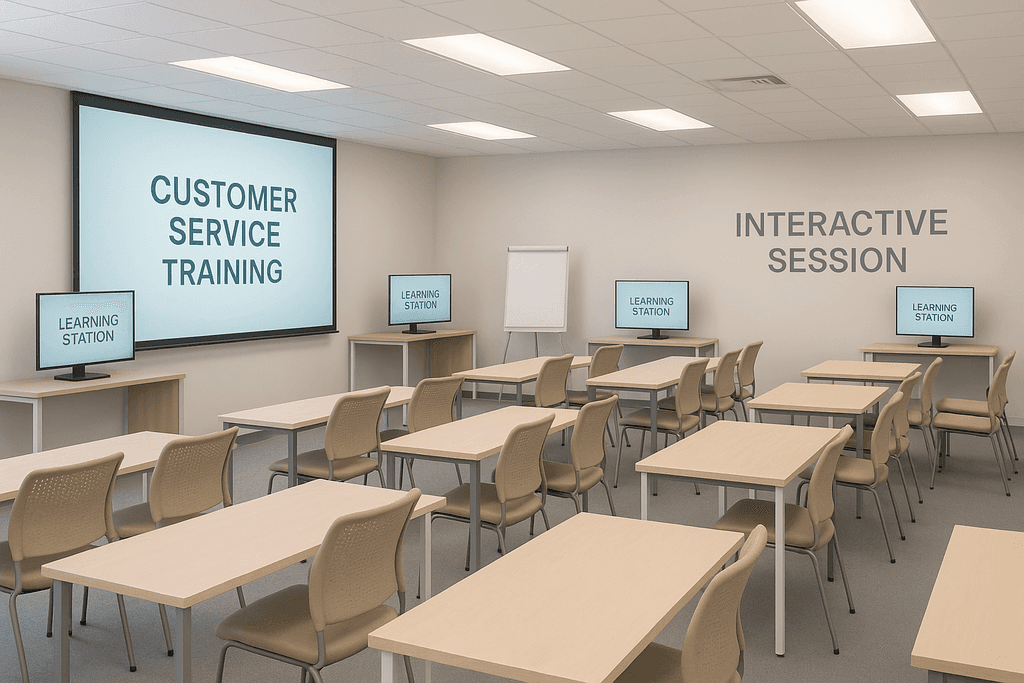September 22, 2025

Picture this: A bustling restaurant, phones ringing off the hook, and frustrated guests waiting endlessly to place orders or make reservations. It's a scene all too familiar in the hospitality industry, where missed calls can mean lost business. Enter AI-powered call systems like Loman.ai, revolutionizing how restaurants handle phone traffic and slashing guest wait times. Let's explore how this technology is transforming the dining experience, one call at a time.
Did you know that restaurants lose an average of $1,000 per week in missed calls? That's a staggering $52,000 annually slipping through the cracks. As dining establishments have grown busier, their phone systems haven't kept pace with increasing customer demands.
Let's take a quick look at how restaurant communication has changed over the years:
Customer expectations have also shifted dramatically. Modern diners want:
Unfortunately, many restaurants still rely on outdated communication methods. This leads to:
The impact on revenue is significant. Studies show that reducing wait times can increase customer satisfaction by up to 33%. Happy customers are more likely to return and recommend the restaurant to others, creating a positive cycle of growth.
As the industry evolves, restaurants need communication solutions that can keep up with demand while maintaining a personal touch. AI-powered systems offer a promising way to handle high call volumes efficiently without sacrificing quality of service.
Let's face it - nobody likes being put on hold. That's where AI call systems come in handy for restaurants. These smart systems can handle multiple calls at once, so customers don't have to wait around twiddling their thumbs.
But it's not just about avoiding hold times. AI assistants are getting pretty good at taking orders too. They plug right into a restaurant's point-of-sale system, making sure everything gets entered correctly.
The cool thing is, these AI systems don't clock out at the end of the night. They're always on, ready to take reservations or answer questions about the menu. And if a customer has a really complex request? The AI knows when to pass the call to a human staff member.
So how much of a difference does AI actually make? Let's break it down with some numbers:
These aren't just random stats - they're real results from restaurants using AI call systems. It's pretty clear that both customers and staff benefit when calls are handled more efficiently.
Let's look at how some actual restaurants are using AI to improve their operations:
One struggling restaurant even turned things around in just 3 months after implementing Loman.ai. They went from barely staying afloat to actually turning a profit.
These examples show that AI isn't just for big chains or tech-savvy spots. All kinds of restaurants are seeing real benefits from using smart call systems.
Now, you might be wondering - doesn't AI make things feel less personal? It's a fair question. But the truth is, AI can actually free up staff to provide better in-person service.
Think about it: when employees aren't constantly answering phones, they can focus more on the customers right in front of them. Plus, AI systems can be customized to match a restaurant's vibe and menu, so callers still get a tailored experience.
Never Miss Another Phone Call. Try Loman Today.
Book a DemoLoman.ai, for example, learns the ins and outs of each restaurant it works with. It can handle questions about ingredients, suggest wine pairings, or even crack jokes if that fits the restaurant's style.
If you're considering an AI call system for your restaurant, here are a few tips to keep in mind:
Remember, the goal is to enhance your service, not replace the human touch entirely. The best AI systems work hand-in-hand with your staff to create a smoother experience for everyone.
Curious about how AI might work in your specific restaurant? Loman.ai offers personalized demos to show you exactly how their system could fit into your operations. It's a great way to see the potential benefits without any commitment.
As restaurants continue to evolve, tools like AI call systems are becoming more common. They're not just a fancy add-on anymore - they're a practical way to improve efficiency and keep customers happy. And in the competitive world of dining, that can make all the difference.

AI phone systems like Loman.ai are just the beginning. As these tools get smarter, they'll change how restaurants talk to customers in big ways.
Here are some key trends we're likely to see:
The real game-changer will be predictive capabilities. Imagine an AI that knows a regular customer's usual order and suggests it automatically. Or one that predicts busy times and helps with staffing. This level of personalization could make a huge difference in customer loyalty.
Of course, there are some hurdles to overcome:
Restaurants that want to stay ahead should start small with AI now. Try out basic systems like automated phone answering or online ordering. This lets you get comfortable with the tech before it becomes a must-have.
As AI gets better at handling calls, it frees up staff to focus on in-person service. This could lead to happier customers and smoother operations. While AI won't replace human workers, it will change their roles. Staff might spend more time on complex tasks that need a personal touch.
AI in restaurants isn't just about efficiency. It's about creating better experiences for both customers and staff. As the tech improves, we'll likely see it become as common as POS systems are today. Restaurants that embrace these changes early on will have a big advantage in the years to come.
AI call systems are changing how restaurants handle phone orders and reservations. By cutting down wait times and boosting efficiency, these systems make life easier for both staff and customers. Loman.ai, for example, takes care of calls 24/7, so no one misses out on placing an order or booking a table.
The long-term benefits are clear. Happier customers tend to come back more often and tell their friends. This word-of-mouth can really help a restaurant grow. Plus, with AI handling calls, staff can focus on giving great service to the people already in the restaurant.
If you're curious about how AI could help your restaurant, it's worth checking out. Learn more about adding smart phone systems to your restaurant and see if it's a good fit. Who knows? It might just be the boost your business needs to take things to the next level.
As we wrap up, remember that technology like this isn't just about being fancy. It's about making things work better for everyone involved. From faster service to fewer missed calls, the potential upsides are hard to ignore. Why not explore how AI could work for your restaurant?
AI call systems like Loman.ai are typically priced based on call volume or as a monthly subscription. Many restaurants see a return on investment within the first few months through increased order accuracy and reduced labor costs. The exact cost depends on your restaurant's specific needs and size.
Most AI call systems are designed to integrate seamlessly with popular restaurant POS systems and other technologies. Loman.ai, for example, works with major platforms like Square, Toast, and Clover. During setup, the AI is configured to fit your existing workflow.
Minimal training is usually required. Your staff will mainly need to learn how to monitor the AI's performance and handle any calls that get transferred to them. The AI handles most of the work, freeing up your team to focus on in-person customer service.
AI call systems prioritize data security and privacy. They typically use encryption and comply with industry standards to protect customer information. It's important to choose a reputable provider that follows best practices for data handling and storage.
Modern AI systems are quite sophisticated and can handle most types of orders, including those with modifications or special requests. They're trained on your specific menu and can ask clarifying questions when needed. For very complex situations, the AI can smoothly transfer the call to a human staff member.
While AI systems like Loman.ai are highly accurate, no system is perfect. If an error occurs, most platforms have easy ways for staff to review and correct orders. Many restaurants find that AI actually reduces errors compared to human staff, especially during busy periods.

Enter your information in the form to receive a call from Loman and place an order like a customer would!